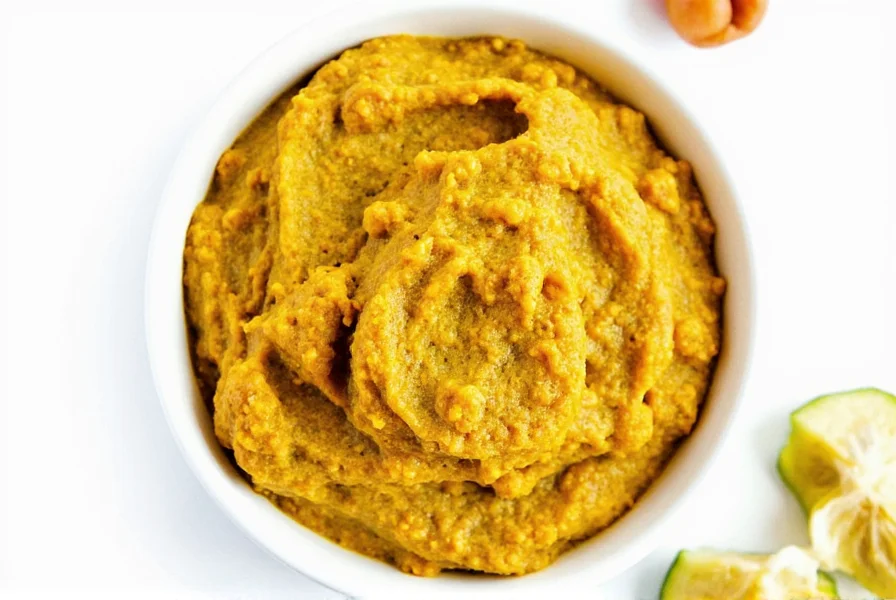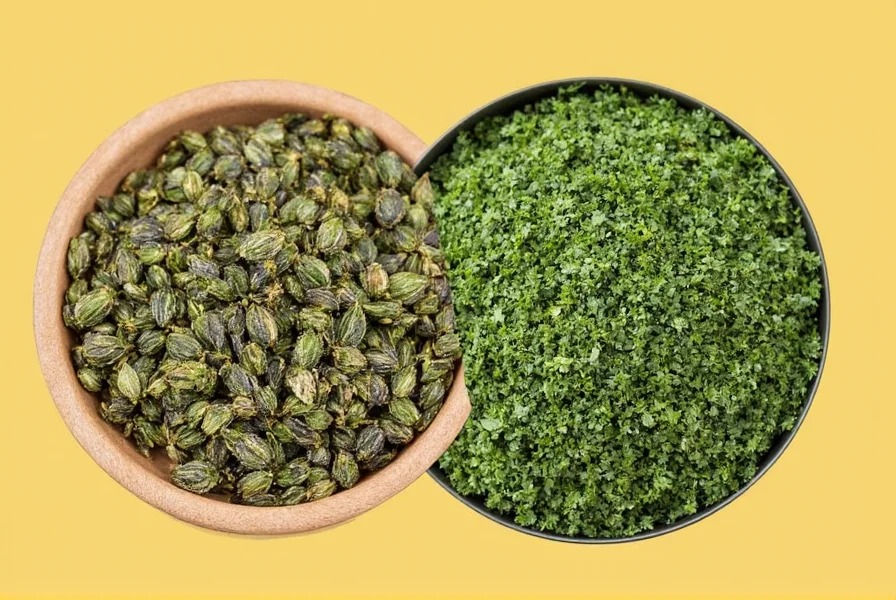If you're out of dry mustard, don't panic! Here are the top 5 alternatives with exact ratios for every recipe, including when to use each one. Whether you're making a sauce, marinade, or baked good, these substitutes will rescue your dish without sacrificing flavor.
In this guide, we'll cover everything you need to know: from what dry mustard is and why you might need a substitute, to detailed comparisons of the best options and practical tips for using them in real recipes. Let's get started!
Table of Contents
- What Exactly Is Dry Mustard?
- Why Substitute Dry Mustard?
- Top 5 Replacements for Dry Mustard
- Comparison Table: Dry Mustard Substitutes
- Buying Guide: How to Choose the Right Substitute
- How to Use These Substitutes in Recipes
- Frequently Asked Questions
- Conclusion
What Exactly Is Dry Mustard?
Dry mustard, also known as ground mustard, is made from grinding mustard seeds into a fine powder. It's a staple in many kitchens due to its sharp, pungent flavor and versatility in both cooking and baking. Unlike prepared mustard (the yellow stuff in the bottle), dry mustard is potent on its own and often used in rubs, sauces, dressings, and even baked goods like cornbread.
When mixed with liquid, dry mustard activates and releases its signature heat and tang — making it a powerful ally in flavor-building.
Why Substitute Dry Mustard?
There are several reasons why you might need a substitute for dry mustard:
- You've simply run out mid-recipe.
- You're allergic to mustard or following a mustard-free diet.
- You want a milder or more intense flavor profile.
- Your pantry doesn't stock dry mustard, but has similar spices.
Whatever the reason, finding a suitable replacement ensures your meal still delivers that depth and bite.
Top 5 Replacements for Dry Mustard
Here are the top five substitutes that can stand in for dry mustard in a pinch — each bringing its own personality and punch to your dish.
1. Prepared Mustard (Especially Dijon)
If you don't have dry mustard but do have a jar of Dijon or yellow mustard, you're in luck. While it's more liquid than powdered, it delivers the same classic mustard flavor. Use about 1 teaspoon of Dijon for every ½ teaspoon of dry mustard required in your recipe.
2. Horseradish
Horseradish packs a powerful punch and mimics dry mustard's heat quite well. However, it's much sharper and doesn't carry the same earthy undertones. Use sparingly — start with ¼ teaspoon for every ½ teaspoon of dry mustard called for — and adjust to taste.
3. Wasabi Paste

Known for its sinus-clearing heat, wasabi is another fiery alternative. Like horseradish, it lacks the complex flavor of mustard but brings serious heat. Use only a tiny dab (about 1/8 tsp) in place of ½ tsp dry mustard. Ideal for sushi-inspired dishes or bold marinades.
4. Turmeric + Vinegar
This combo offers mild heat and color similarity. Turmeric alone won't replace the mustard kick, but when mixed with a splash of vinegar or lemon juice, it approximates both the tang and warmth. Great for sauces and salad dressings where visual appeal matters too.
5. Whole Mustard Seeds
If you've got whole mustard seeds lying around, grind them up using a spice grinder or mortar and pestle. This gives you a texture and flavor close to dry mustard. The heat will be slightly less immediate, but the earthy richness remains. Grind until very fine for best results.
| Substitute | Flavor Profile | Heat Level | Best For | Usage Ratio |
|---|---|---|---|---|
| Dijon Mustard | Sharp, tangy, complex | Moderate | Sauces, dressings, marinades | 1 tsp = ½ tsp dry mustard |
| Horseradish | Pungent, sharp, clean | High | Creamy sauces, dips, roasted meats | ¼ tsp = ½ tsp dry mustard |
| Wasabi Paste | Fiery, green onion-like | Very High | Sushi, fusion dishes, marinades | 1/8 tsp = ½ tsp dry mustard |
| Turmeric + Vinegar | Earthy, tangy, slightly bitter | Low-Mild | Colorful dishes, vegan recipes | ½ tsp turmeric + ½ tsp vinegar = ½ tsp dry mustard |
| Ground Mustard Seeds | Similar to dry mustard | Moderate | All-purpose use | 1 tsp freshly ground seeds = ½ tsp dry mustard |
Buying Guide: How to Choose the Right Substitute
Selecting the perfect substitute depends on what you have available, your flavor preferences, and the nature of the dish you're preparing. Here's a handy breakdown to help you choose wisely.
For Tangy Depth: Dijon Mustard
- Best For: Dressings, glazes, marinades
- Feature: Complex flavor profile, creamy texture
- Target Audience: Home cooks, bakers, barbecue lovers
- Recommended Brand: Grey Poupon Dijon
For Serious Heat: Horseradish
- Best For: Creamy sauces, steak rubs, deviled eggs
- Feature: Sharp, sinus-clearing kick
- Target Audience: Flavor chasers, gourmet chefs
- Recommended Brand: Heinz Prepared Horseradish
For Exotic Zest: Wasabi Paste
- Best For: Sushi, Asian-inspired dishes
- Feature: Unique, bright heat
- Target Audience: Fusion food fans, adventurous eaters
- Recommended Brand: Eden Foods Wasabi Paste
For Vegan-Friendly Color & Mild Flavor: Turmeric + Vinegar
- Best For: Plant-based recipes, golden milk, curries
- Feature: Earthy and colorful
- Target Audience: Vegans, wellness enthusiasts
- Recommended Brand: Frontier Co-op Organic Turmeric
For Authentic Taste: Ground Mustard Seeds
- Best For: Pickling, spice rubs, homemade condiments
- Feature: Natural, fresh-ground flavor
- Target Audience: DIY spice mixers, artisanal cooks
- Recommended Brand: McCormick Whole Yellow Mustard Seeds
How to Use These Substitutes in Recipes
Using these substitutes effectively means understanding how they interact with other ingredients. Here are some practical tips:
- Dijon Mustard: Add directly to vinaigrettes or sauces. Stir into mayo for a quick burger spread.
- Horseradish: Mix into sour cream or Greek yogurt for a spicy dip. Use sparingly in dressings.
- Wasabi: Blend into miso paste or mayonnaise for sushi sandwiches. A little goes a long way.
- Turmeric + Vinegar: Best added early in the cooking process to develop flavor. Perfect for simmered sauces or rice dishes.
- Ground Mustard Seeds: Toast briefly for extra aroma. Works well in brines and dry rubs.
Frequently Asked Questions
What's the best substitute for dry mustard in cheese sauce?
Dijon mustard is the best substitute for dry mustard in cheese sauce. It provides the same tangy flavor without altering the texture. Use 1 teaspoon of Dijon for every ½ teaspoon of dry mustard called for. The vinegar content in Dijon helps prevent the cheese from becoming grainy while adding that essential sharpness that balances the richness of the cheese.
Can I use yellow mustard instead of dry mustard?
Yes, you can use yellow mustard as a substitute, but with some adjustments. Yellow mustard contains water, vinegar, and other ingredients that change the liquid balance of your recipe. Use 1 teaspoon of yellow mustard for every ½ teaspoon of dry mustard required. If your recipe is sensitive to additional liquid (like dry rubs or baked goods), reduce other liquids slightly or let the mixture cook a bit longer to evaporate excess moisture.
How do I make a dry mustard substitute without mustard seeds?
Without mustard seeds, create a substitute using equal parts turmeric and paprika plus a splash of vinegar or lemon juice. For every ½ teaspoon of dry mustard needed, use ¼ teaspoon turmeric, ¼ teaspoon paprika, and ¼ teaspoon vinegar. This mimics both the color and tanginess of dry mustard. Horseradish (¼ teaspoon per ½ teaspoon dry mustard) is another excellent option when you need heat without actual mustard ingredients.
Does dry mustard expire, and how can I tell?
Dry mustard typically maintains peak quality for 3-4 years but doesn't technically expire. It gradually loses potency over time. To test if yours is still good, mix ½ teaspoon with 1 teaspoon warm water and a pinch of sugar. Fresh dry mustard should create a strong, pungent aroma within 5 minutes. If the smell is weak or barely noticeable, it's time to replace it. Store dry mustard in an airtight container away from light and heat to maximize shelf life.
Are there any vegan alternatives to dry mustard?
All the substitutes mentioned are naturally vegan except for some prepared mustards that might contain honey. For vegan cooking, Dijon mustard (check label for honey), horseradish, wasabi paste, and turmeric-vinegar combinations are excellent vegan alternatives. Ground mustard seeds are also vegan-friendly. When using prepared mustards, always verify the ingredients list to ensure no animal products like honey or dairy derivatives are included.
What's the difference between dry mustard and ground mustard?
There is no practical difference between dry mustard and ground mustard—they're the same product with different naming conventions. Both refer to mustard seeds that have been ground into a fine powder. The term "dry mustard" emphasizes that it's not prepared with liquid (like bottled mustard), while "ground mustard" describes the physical form. In recipes, these terms are completely interchangeable with no adjustment needed.
Can I substitute dry mustard in baking recipes?
Yes, but with careful selection. For baked goods like cornbread or biscuits where dry mustard adds subtle complexity without overwhelming heat, Dijon mustard works best (use half the liquid amount called for in the recipe). Avoid horseradish and wasabi in baking as their intense heat can dominate delicate flavors. For yeast breads, the turmeric-vinegar substitute works well as the vinegar helps activate yeast while turmeric provides color without altering the bread's rise.
Conclusion

Running out of dry mustard doesn't have to derail your culinary plans. With a bit of creativity and an understanding of flavors, you can easily swap it out for one of these worthy substitutes.
Whether you opt for the familiar tang of Dijon, the fiery zing of horseradish, or the vibrant hue of turmeric, each alternative opens up a new dimension of taste. So next time your mustard stash runs low, don't panic — reach for one of these kitchen heroes instead.
Stay spicy, stay smart, and always keep a few backup flavors on hand. You never know when your favorite spice might take a day off!










 浙公网安备
33010002000092号
浙公网安备
33010002000092号 浙B2-20120091-4
浙B2-20120091-4